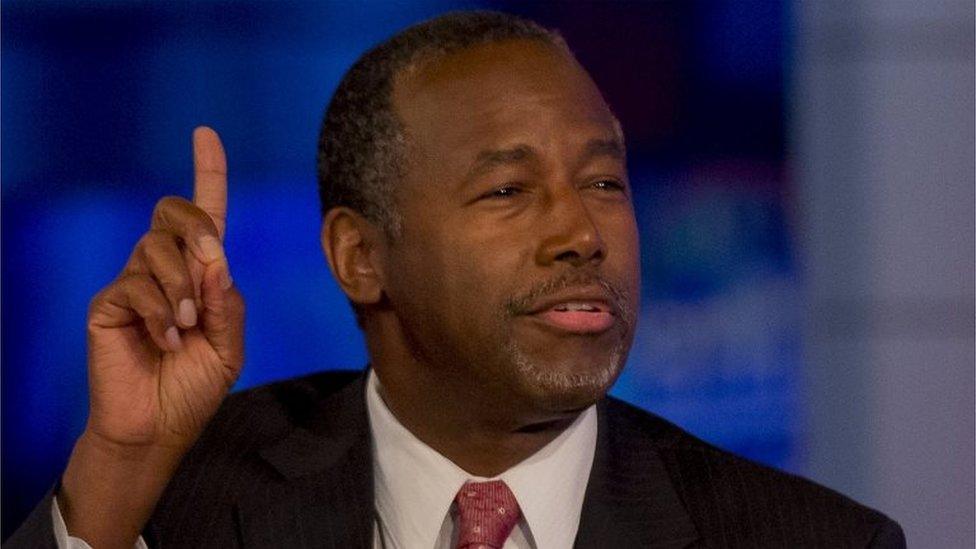Ben Carson: Unable to process foreign policy?
- Published
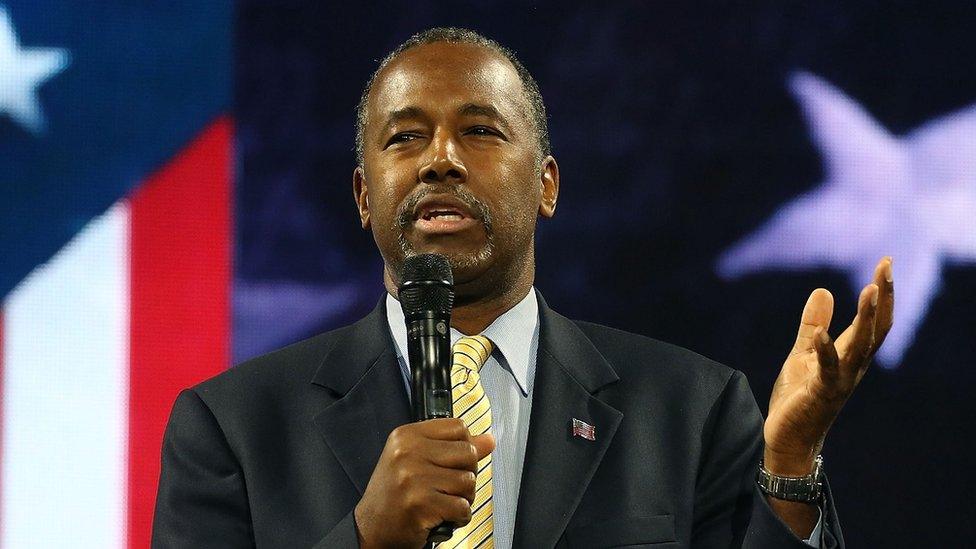
One of Ben Carson's foreign policy advisers is claiming that the retired-neurosurgeon-turned-presidential-candidate has been unable to process "one iota of intelligent information about the Middle East".
According to a New York Times report, external, Duane R Clarridge - a retired Central Intelligence Agency official who has been coaching Dr Carson on international affairs for several years - has been frustrated with his inability to comprehend the intricacies of national security despite regular briefings from experts.
Dr Carson and his campaign have since vehemently denied the allegations in the report.
In an interview, external with PBS NewsHour on Tuesday night, Dr Carson said that calling Mr Clarridge an adviser "would be a great stretch".
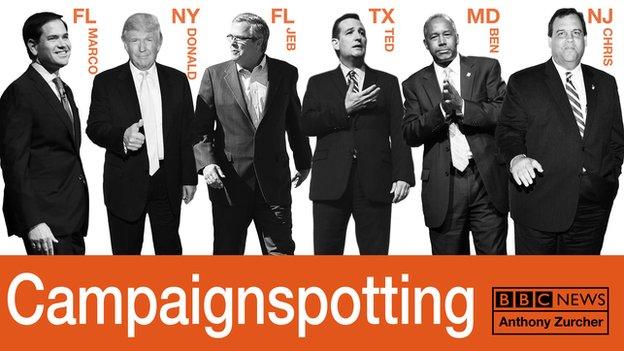
"He is a person who has come in on a couple of our sessions to offer his opinions about what was going on," he said. "And he has no idea who else I'm sitting down and talking to."
Carson campaign spokesperson Doug Watts took a different tack, external, noting that the 83-year-old Clarridge - who was indicted for lying to Congress as part of the Iran-Contra scandal in the 1980s and later pardoned by President George HW Bush - is coming to the "end of a long career serving our country".
"For the New York Times to take advantage of an elderly gentleman and use him as their foil in this story is an affront to good journalistic practices," he said in a statement.
The Times stands behind its article, noting that long-time Carson business manager Armstrong Williams recommended that their reporters contact Mr Clarridge.
The Carson campaign's efforts to push back, so far, have been met with incredulity by much of the media.
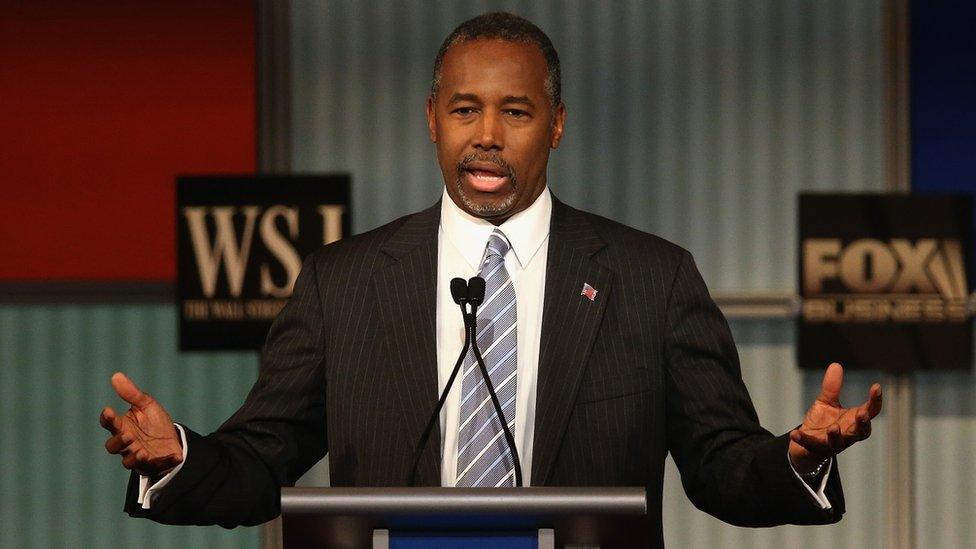
Ben Carson was criticised after the most recent Republican debate for saying that Chinese forces are involved in the Syrian Civil War
"So the Carson campaign's defence is that one of the candidate's foreign policy advisers - regardless of whether he's a 'top' adviser or not - is an 'elderly gentleman' who is easily duped by a reporter?" asks, external US News & World Report's Robert Schlesinger. "Seriously? Is that supposed to make voters feel more comfortable with Carson or his operation?"
New York Magazine's Jonathan Chait quips, external that Dr Carson's "advisers now appear genuinely terrified that he might be elected president and are doing everything in their power to stop it."
The Times article could end up being particularly damaging in light of recent public focus on national security following last week's Paris attacks and Dr Carson's apparent difficulty handling questions on international policy.
Obama v the critics who call him weak on fighting IS
During the last Republican debate in Wisconsin on 10 November, Mr Carson offered a convoluted response to whether he approved of Barack Obama's decision to send US special forces into Syria.
"Well, putting the special ops people in there is better than not having them there, because they, that's why they're called special ops," he said.
He also asserted - incorrectly, according to most experts - that Chinese forces were involved in the Syrian conflict.
In a Fox News interview, external on Sunday, Dr Carson was unable to explain which nations should be involved in a US-led coalition to fight the so-called Islamic State in Syria.
"He's been briefed on it so many times," Mr Williams told the Times. "I guess he just froze."
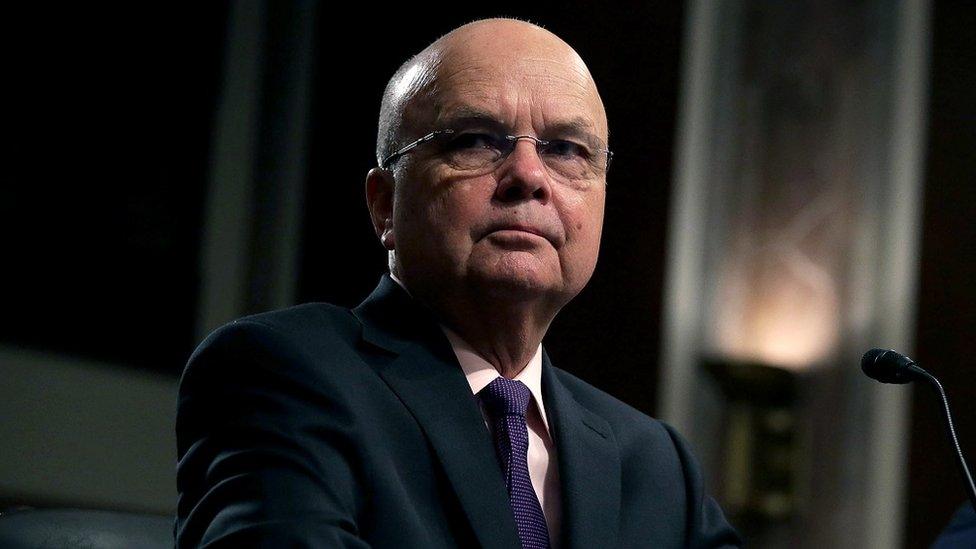
Former CIA director Michael Hayden says foreign policy is a database with which Mr Carson is "very unfamiliar"
Dr Carson also said during the Fox interview that the US should impose a no-fly zone in Syria and fire on Russian planes if necessary.
"If they violate it, we will, in fact, enforce it," he said. "And, you know, we'll see what happened. You know, too, for us to always be backing down because we are afraid of a conflict, that's not how we became a great nation."
When asked, external by the Miami Herald about current US policy toward Cuban refugees, Dr Carson demurred.
"I have to admit that I don't know a great deal about that, and I don't really like to comment until I've had a chance to study the issue from both sides," he said.
Last week former CIA director Michael V Hayden told MSNBC of a phone conversation he had with Dr Carson two months ago.
"His instincts are all right," he said. "But this is a database in which he's very unfamiliar."
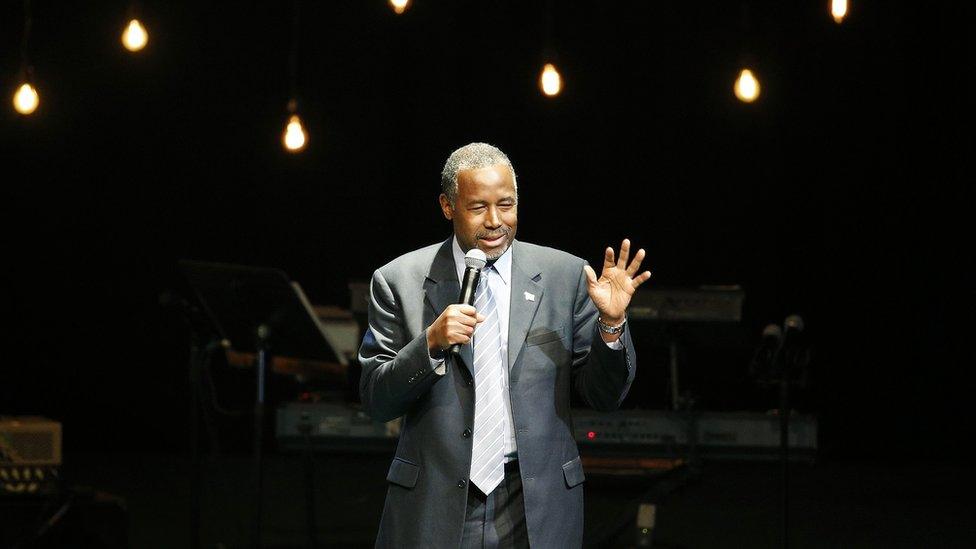
Ben Carson says he knows "a lot more" about foreign policy than he used to
During his PBS interview, Dr Carson insisted that his foreign policy education is an ongoing process.
"I know a lot more than I knew," he said. "A year from now, I will know a lot more than I know now."
Advisers turning on their former wards - whether to advance their own interests or settle old scores - is a time-honoured tradition in US politics, of course. Normally, however, it happens at the end of a losing campaign and not while the candidate stands atop the polls, as is the case with Dr Carson.
And most of the time the dirt-dishing happens anonymously, not in on-the-record interviews.
Dr Carson has run an unconventional presidential campaign so far - light on details and heavy on the candidate's rags-to-riches life story and quiet, humble affect. He's steered clear of engaging in the back-and-forth with fellow candidates, despite harsh words from fellow front-runner Donald Trump.
So perhaps it's not surprising that when it comes to inside-the-campaign turmoil the old rules aren't applicable here, either.
Republican candidates in - and out - of the 2016 presidential race

- Published13 November 2015
- Published26 October 2015
- Published9 October 2015
